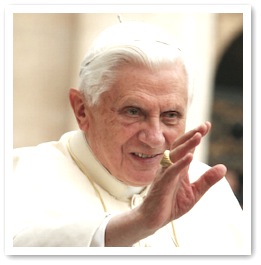A final message of love and hope
- FATHER RAYMOND J. DE SOUZA
On this feast of Saint Benedict, the sixth-century monk whose spiritual sons saved civilization, it is a small sadness to realize that we may have read the last of the beautiful theology and biblical wisdom of the man who took his name, Joseph Ratzinger, Benedict XVI.
 |
Last Friday, Pope Francis published his first major teaching document, the encyclical Lumen Fidei, "The Light of Faith." But as Francis himself acknowledged and as any reader can tell, the text Francis signed was one drafted by Benedict, and left on the papal desk after the latter's abdication in February. A lot of nonsense has been written about the humility of Francis in light of irrelevant things, like his shoes. That he would openly publish the work of another man — a more gifted writer and scholar — is a true mark of humility.
Lumen Fidei can thus be considered a final testament of Benedict XVI. he returns to the questions that have occupied him for more than six decades of scholarship and prayer — is the Christian faith true? What does Jesus Christ bring to us that makes life better, more free, more beautiful? Is it reasonable to believe? If not, what does a world without the transcendent dimension of faith look like? What can man hope for if reliant entirely, as it were, on his own devices?
"The pagan world, which hungered for light, had seen the growth of the cult of the sun god, Sol Invictus, invoked each day at sunrise," Lumen Fidei opens. "yet though the sun was born anew each morning, it was clearly incapable of casting its light on all of human existence. The sun does not illumine all reality; its rays cannot penetrate to the shadow of death, the place where men's eyes are closed to its light. 'No one' — Saint Justin Martyr writes — 'has ever been ready to die for his faith in the sun.'"
That search for the light of understanding continues to our day; the search for causes worth living for, and dying for. Even with the advances in knowledge that marked the Enlightenment, reason alone was insufficient for the great questions of human existence.
"It would become evident that the light of autonomous reason is not enough to illumine the future; ultimately the future remains shadowy and fraught with fear of the unknown," the pope writes. "As a result, humanity renounced the search for a great light, Truth itself, in order to be content with smaller lights which illumine the fleeting moment yet prove incapable of showing the way. yet in the absence of light everything becomes confused; it is impossible to tell good from evil, or the road to our destination from other roads which take us in endless circles, going nowhere."
Some of those roads lead to very dark places, as a son of Germany knows all too well, given the paths that philosophy and statecraft have taken in his homeland these past two centuries. It is precisely the experience of these endless circles of hopelessness and even brutality that have weakened our confidence that we can know anything.
"Truth nowadays is often reduced to the subjective authenticity of the individual, valid only for the life of the individual," notes Lumen Fidei. "A common truth intimidates us, for we identify it with the intransigent demands of totalitarian systems."
Christian faith, contrariwise, does not come to us as a threat, as Lumen Fidei explains in a passage addressed to a world afraid to believe and of religious believers:
"But if truth is a truth of love, if it is a truth disclosed in personal encounter with the Other and with others, then it can be set free from its enclosure in individuals and become part of the common good. As a truth of love, it is not one that can be imposed by force; it is not a truth that stifles the individual. Since it is born of love, it can penetrate to the heart, to the personal core of each man and woman. Clearly, then, faith is not intransigent, but grows in respectful coexistence with others. One who believes may not be presumptuous; on the contrary, truth leads to humility, since believers know that, rather than ourselves possessing truth, it is truth which embraces and possesses us. Far from making us inflexible, the security of faith sets us on a journey; it enables witness and dialogue with all."
One who believes may not be presumptuous; on the contrary, truth leads to humility, since believers know that, rather than ourselves possessing truth, it is truth which embraces and possesses us.
Contemporary man is suspicious of faith, or even any truth at all, for it might be a threat to his own autonomy, his own freedom. A world of suspicion is fundamentally a world of fear. The alternative proposal is a truth that comes to us from an authority that loves us, and that is love itself. That is the Christian good news, that the One who says "I am the truth" is also the "God who is love." That, both Benedict and Francis argue, is the path out of circles of suspicion and fear, toward a future full of hope.
 This is Meaghen Gonzalez, Editor of CERC. I hope you appreciated this piece. We curate these articles especially for believers like you.
This is Meaghen Gonzalez, Editor of CERC. I hope you appreciated this piece. We curate these articles especially for believers like you.
Please show your appreciation by making a $3 donation. CERC is entirely reader supported.

Acknowledgement
Father Raymond J. de Souza, "A final message of love and hope." National Post, (Canada) July 11, 2013.
Reprinted with permission of the National Post and Fr. de Souza.
The Author
Father Raymond J. de Souza is the founding editor of Convivium magazine.
Copyright © 2013 National Post



